 |
 |
 |
 |
 |
 |
 |
 |
 |
First Division - Elland Road - 36,812
Scorers: Clarke
Leeds United: Sprake, Reaney, Cooper, Bremner, Charlton, Hunter, Bates (Davey), Clarke, Jones, Giles, Gray
West Bromwich: Cumbes, Hughes, Merrick, Lovett, Wile, Kaye, Suggett, Brown, Astle, Hope, Hartford
'Needing a win against West Bromwich Albion to draw away
from the nagging challenge of Bertie Mee's Arsenal side, Don
Revie's Leeds United are already 1-0 down. Then, a poor ball from
Norman Hunter cannons off Tony Brown into the Leeds half, where Albion's
Colin Suggett is loitering at least 15 yards offside. More in hope than
expectation, Brown continues his charge towards goal, and linesman Bill
Troupe duly raises his flag. So transparent is the offence that there
is a moment of suspended animation while players on both sides wait for
referee Ray Tinkler to blow his whistle. He does not. An almost apologetic
Brown continues on towards the Leeds goal before squaring for Jeff Astle
to execute a simple tap in. Astle, smirking and still half expecting the
referee to see sense, jogs back to the halfway line. A decision of almost
baroque incompetence has cost Don Revie and Leeds United the championship. 'As the truth dawns that Tinkler has given the goal,
Elland Road explodes with rage. There follows one of English football's
most bizarre pitch invasions. A handful of spectators, many of them advancing
in years, emerge from the packed stands to remonstrate with Tinkler, who
is now surrounded by burly policemen. One bewhiskered invader is nattily
attired in what is surely a Burton's blazer. This is Leeds after all.
A breathless Davies is as incredulous as the players: "Leeds will
go mad," he shouts, "and they have every justification for going
mad!" If only momentarily, Tinkler's personal safety appears to be
in jeopardy. Twenty years later, Johnny Giles is still indignant: "They
weren't hooligans, they were grown men. How he could give the goal there,
I just don't know." Don Revie, stunned that a season's graft has
been undone by one single individual, walks on to protest but appears
to think better of it. Hunched in a blue gabardine raincoat and chewing
fiercely, he gazes skywards in disbelief. He has seen it all before. Davies,
screaming now to be heard above the crowd, sympathises. "Don Revie,
a sickened man," he yells. "Just look at him, looking at the
heavens in disgust!" 'Utter the words "that bastard Tinkler" to
any Leeds fan over a certain age and you'll meet with instant recognition.
That infamous afternoon has come to encapsulate the Revie era, when one
of the greatest club sides English football has ever produced ran the
gauntlet of official obduracy, media disapprobation and ill-fortune of
sometimes grotesque proportions.' Controversy involving officials litters the history
of Leeds United: in 1967 Ken Burns disallowed
two late goals in the Cup semi final defeat to Chelsea; there
would be referee-influenced outcomes in European finals against
Milan and Bayern Munich; and Keegan and Bremner incurred Possibly the stormiest aftermath of all was provoked
by one particular and uniquely personal interpretation of the
offside law in April 1971, leading to the name of a new pantomime
villain being inscribed indelibly in the Leeds United Book of
Grievances. When an out of sorts West Bromwich Albion side visited
Elland Road for a vital First Division clash on 17 April 1971,
the result seemed a foregone conclusion: Albion had lost every
one of their six League games at Elland Road since United's return
to the First Division in 1964, with one 5-0 FA Cup thrashing thrown
in for good measure; they had not won away from the Hawthorns
since December 1969, indeed they hadn't enjoyed a victory anywhere
since 6 March and had gained just three points from the previous
seven games. Though Leeds' momentum had been stayed by a 3-1
defeat at Chelsea at the end of March, they remained two points
clear of Arsenal at the top of the table. The Gunners, however,
had two games in hand and had won seven straight games in the
League, so victory against Albion was essential. It was some relief for Leeds manager Don Revie that he was
able to select Billy Bremner for only the second time since 23 February.
The club captain had returned during the week to score the winner in the
Fairs Cup semi-final defeat of Liverpool at Anfield, and his availability
was a real morale booster. Also returning was Eddie Gray, making his first
start of 1971. Both Scots had been plagued by injuries throughout the
campaign. Revie's selection was made easier when Paul Madeley
went down with a stomach upset on the day of the game and was
ruled out. Peter Lorimer was also unavailable, still suffering
with the hamstring he pulled the previous Monday in a goalless
draw at Huddersfield. The first quarter of an hour of the game was played
out almost exclusively in the Albion half, with Gray enjoying
a lot of possession. United sought desperately for an early goal
and pressed the Midlanders back. But the Albion players were clearly
determined not to make life easy and worked hard to deny their
hosts the space to create any clear cut opportunities. Whenever a Leeds player had possession, he was quickly
harried and pressed by an opponent. An early ball from Gray found
Mick Jones on the right, but centre-half John Wile was touch tight
to his back, shepherding him away from the goal and out where
he could do no damage. Then, when Mick Bates found Gray out on the left,
twenty yards out, his drive had insufficient force behind it and
goalkeeper Jim Cumbes gathered it easily enough, low down on his
six-yard line, offering no prospect of a loose ball to the onrushing
Allan Clarke. Albion's attempts at easing the pressure were predicated
almost exclusively on the long ball into the Leeds half. That
represented easy fare for Norman Hunter and Terry Cooper to pick
off, allowing them to give Johnny Giles the possession he required
to direct operations. The Irishman contrived one move which brought
Cooper onto the overlap to lob a centre to Clarke on the edge
of the penalty area. He could get no power in his header, however,
which rolled tamely to the waiting Cumbes. When Bates threw a centre from the right to the
back post, it cleared the waiting Clarke and Gray could only loop
his header limply, high above the bar. When Clarke chased a long ball down the left he
was blocked as the two men battled for possession and he earned
Leeds a free kick 30 yards out. Giles lofted the ball to the far
post where Jones challenged The home side were showing some signs of anxiety
as the Midlanders carved out some openings of their own and after
19 minutes it was Albion who broke the deadlock. As the Baggies
came out to challenge the advancing United defence, Jack
Charlton tried a square pass on the half way line, but it
found only Jeff Astle, who arced it through the inside-right channel
for Colin Suggett. He made ground and speared a low ball to Tony
Brown, racing through a square defence to the edge of the area.
Brown, the division's leading goalscorer, accepted the opportunity
coolly and slid the ball first time past Gary Sprake and low into
the corner. The goal rocked United and prompted an instant response.
They pressed Albion back with Paul Reaney and Cooper now on perpetual
attack down the flanks. Charlton came up for a corner and was still there,
waiting for Giles' high ball back in, after Albion had partially
cleared the first cross. Leeds were awarded an indirect free kick
on the penalty spot when Charlton was obstructed as he tried to
meet the ball. Play was held up for a minute and a half as referee
Ray Tinkler strove in almost schoolmasterly fashion to press a
ten man wall back the required distance. His efforts were almost
comic in their lameness. The Albion line was no more than five
yards away from the kick when, at the third time of asking, Gray
fired it goalwards, only to see his shot smothered by the defensive
barrier. When Bremner was taken out by Merrick on the left
wing, it gave Giles the opportunity to float in a dangerous free
kick which Jones launched himself at, but again the goalkeeper
was safe and assured in his handling. The United players were becoming heated in their
anxiety and protested vehemently at every challenge. Their usual
assurance was missing at the back; they rushed their moves, and
too many passes were wild and hurried. In their haste they could
not build any cohesive pattern or rhythm and made it a simple
matter for Albion to resist their threat. The visitors' irregular attacks were now the more
incisive and from one overlap just before the break, a ball came
looping in from the left towards Sprake's crossbar, requiring
the keeper to touch it away from the danger area. Don Revie brought Nigel
Davey on for Bates at half time with the intention of releasing
Cooper into a permanent offensive role. The early signs were good and Gray, as in the first
half, had an early opportunity, but flashed it over the top of
Cumbes' goal from the edge of the area. Albion showed they still offered a goal threat and
when Suggett outpaced Hunter to a through ball he found Brown
on the edge of the box. The Hunter worked his way with some neat footwork through
the inside-left channel to find Cooper and the left-back's cross
brought fervent United cries for hands as it struck an Albion
defender but the referee would have none of it. Albion broke away to create a scoring chance for
Hartford but his fierce
low drive from 20 yards bounced clear off a Leeds man. United took the opportunity to break out and when it looked
like Bremner would get away into space at half way there was an ugly looking
tangle with the challenging Lovett. It looked like the Scot had lost it
as he lashed out with his elbow in the direction of his tormenter's face,
but in the end nothing came of the clash. United were awarded the free
kick and hurried on about their work. For once they used the opportunity well and carved
out a genuine threat as Cooper fired in a telling cross. It ran
out to the far side and Gray's instant centre was nodded into
the net by Jones, but the referee blew up for offside against
the striker. That sparked some angry mutterings from the crowd
who were starting to vent their spleen on referee Ray Tinkler,
who appeared reluctant to give them anything. Bremner was again baulked unfairly as he made space
with some decent footwork about 30 yards from goal, though he
managed to find Davey to his left. The substitute's lofted cross
allowed Clarke to get a headed flick on that looped agonisingly
towards Cumbes' left hand post before the keeper dived to tip
it round for a corner. Gray's inswinging flag kick was cleared, but Giles
fired in a snap volley to the falling ball. Again Cumbes was the
master, palming it away before securing possession. United continued to pour forward, with all their
defenders pushing on and Hunter's 25-yard shot slipped narrowly
over Cumbes' bar. But Albion were still looking dangerous and when
Astle, Suggett and Brown combined well in United's area they should
have made more of the opportunity than Brown's soft shot wide. Leeds again appealed desperately for a penalty when
Wile hacked down Clarke as he chased a long ball forward into
the area, but the referee would have Albion were disallowed a goal for offside when Suggett
followed in on Hope's long range effort as it came back off the
diving Sprake. That was the prelude for disaster, as United forsook all
pretence of defence. Hunter brought United forward on the left just inside
the Albion half in the 69th minute. His misplaced pass inside was intercepted
by Brown who raced forward with it. The linesman's flag was instantly
raised as Suggett, yards offside and the only man in the United half apart
from Sprake, ran forward into the empty space. Brown pulled up, seemingly
knowing the game was up as the hopelessly out of position United defenders
hesitated. But Ray Tinkler waved play on, ignoring the flag
and insisting that there was no offence. Brown, finally realising
his fortune, picked his way on towards the unguarded area and
the oncoming Sprake. As the goalkeeper advanced, Brown slipped
the ball forward to Astle, also looking suspiciously offside,
to his left. The centre-forward obliged with a simple tap in as
Reaney sought vainly to catch him. The ground was a sea of chaos as it became clear
that Tinkler was going to allow the goal to stand. The United
players and Don Revie were frantic with anger, ushering the linesman
over to intervene with the referee. Tinkler consulted with his
assistant, but would only confirm his original conclusion - the
goal was good! That was the signal for scenes the like of which
Elland Road had never seen. There was an invasion of supporters,
in the main middle aged men in suits, furiously trying to get
at the referee. The police response was immediate and very effective,
blocking all attempts at interference. Nevertheless the disturbance
went on for what seemed an age as players and fans alike gave
way to emotional outbursts of rage. One of the linesmen, Bill
Troupe of South Shields, was hit by a missile thrown from the
crowd. In all, four minutes passed before order was restored. Mick Jones: 'None of us could believe the goal had been
given, but the referee was adamant: the goal stood. The crowd was also
incensed and a number of them raced onto the pitch; they were so frustrated.
What riled them so much was that after my goal was unluckily chalked off,
a blatant offside goal was given. I managed to stop one person as he raced
towards the referee. He was so angry, if he'd reached him, I hate to think
what he'd have done. I'm convinced that if my goal had stood we'd have
gone on to win the game, but the decision knocked us back.' When play eventually restarted, there was not even
a semblance of calm. United simply flew into the attack with only
a skeleton crew patrolling their own half of the field. However,
they could make little headway and found few chinks in the Albion
armour. Finally, with two minutes of normal time remaining,
Clarke raced onto a ball into the area and flicked it smartly
through the gap between Cumbes and his right hand upright. It
was a piece of classic finishing by Clarke and gave United the
faintest whiff of a revival. Injury time seemed to go on forever with almost
every player packed into the third of the pitch nearest to Cumbes'
goal. The United assaults grew more and more frenetic, but there
was never a genuine chance of an equaliser; Jones did threaten
momentarily from a ball down the channel but he was ushered wide
and then it looked like Cooper had been pushed as he vainly tried
to get a touch to a through Finally Tinkler blew the whistle and put United out of their
misery, their championship hopes in tatters. The referee was calmness
itself as he made his way, unconcerned, from the playing arena. Richard Ulyatt in the Yorkshire Post: 'In the 45
years I have reported football I have never seen a worse decision by a
referee than the one Mr Ray Tinkler gave at Elland Road on Saturday ...
Nine out of ten referees would have given offside. Mr Tinkler was the
tenth. 'That
was not the only effect of a wretched decision. The angry spectators who
rushed on to the ground will probably get the club into trouble with the
FA, who will not tolerate attacks such as those which followed on match
officials. 'Mr Tinkler seemed the least worried of any of the major
figures. "As far as I am concerned," he said, "the player
was not interfering with play, the player with the ball was not offside
and therefore there was no need to whistle. That was what I asked the
linesman and he agreed. Afterwards my main concern was to get the match
restarted." 'When West Bromwich settled
down it was apparent that, with a four-man defensive screen to protect
the goalkeeper, they did not really expect winning away from home for
the first time since December 1969. When Brown had smartly taken his gift
goal their determination to cling to the lead was illustrated by their
increasing the screen to five men. When offside failed, Albion were prepared
to try other means of relieving pressure and of the 33 free kicks given
for physical fouls, 24 went against them. I believe it was frustration
caused by offside and fouls which not only prevented Leeds attaining rhythm
but which upset volatile spectators. 'Long before the main row boos and slow handclaps followed
the referee's decisions. Tension was growing with every minute.' Don Revie: 'I have never been so sick at heart. The ref's
decision on Suggett, the worst I have ever seen and, boy, was wrong, and
it wrecked nine months' hard work here. We must have professional referees
... I regret the crowd scenes like anybody else, but I can understand
why they cut loose.' The Times: 'Leeds United are to make an official
protest to the Football League over the handling of Saturday's match with
West Bromwich Albion by Ray Tinkler ... The club directors also backed
up manager Don Revie's call for full time professional referees ... Alderman
Percy Woodward, the chairman, said: "We will be forwarding a letter
to the League in which we will make a formal protest about the handling
of the game by the referee." The board took the decision after being
given a full report of the match by Mr Revie. He has long been a campaigner
for professional referees.' The Yorkshire Evening Post offered an interesting
take on events: 'Leeds lead the call for full time professional referees.
It is inevitable that a way should be sought to minimise the risk of further
mistakes last Saturday's. It is right that the question of professional
referees should be thrashed out. Can a man do the job part time for a
reward of £10.50 a match and expenses and at the same time cope with the
pressure cooker of modern professional football? 'Another vexed question is whether even a professional referee
would be proof against the odd off day. And what would professional referees
do when their whistling days were over? 'If it was decided to recruit professionals, who might look
for a man with experience in the control and management of men - a company
executive perhaps? A man with a decade of experience as a referee. A man
of such ability that he could be entrusted with an FA Cup semi-final.
A man able to handle a Wembley FA Amateur Cup final. 'Such a man exists. His name is Mr Ray Tinkler of Boston,
Lincolnshire. 'By all means let's explore the possibility of professional
referees. But do not run away with the idea professionalism automatically
means perfection.' By the following weekend, the dust had started to settle
and Phil Brown summed up thus in the Evening Post: 'Mr Ray Tinkler
... only partly cost Revie's men the match. United lost because they were
definitely the inferior team. They have lost their leadership because
Arsenal, who will be at Elland Road on Monday, have gone on winning -
nine in a row up to today. And there is no answer to that but to equal
it, which United have not. 'Normally United would have overhauled and passed Albion's
brace of goals which, let it be said, keeper Gary Sprake had no chance
of stopping because of the woeful defence in front of him. Indeed, Sprake
stopped two certainties, although I do not suppose his critics will give
him any credit for that. 'United have beaten better sides than Albion many a time
away from home, let alone at Elland Road, and coming from behind, too.
Last Saturday their football collective and individual went to the winds. 'Maybe the tremendous effort in winning at Anfield in the
Fairs Cup semi final had taken the sap out of them, maybe they had not
sufficient left after that win in the closing weeks of another gruelling
season, maybe Bremner and Gray had not had sufficient match practice.
But speed and accuracy had gone, and you do not win the championship without
those two. 'For one reason or another, United have not played to par
form, let alone best form in more than half their matches since the turn
of the year. Since then have come the three wickedly punishing home defeats 'There was also the still astonishing
Cup defeat at Colchester in February. Forward and back, and always
carrying heavy injuries, a most gallant side has begun to waver. 'Came the crucial events of last Saturday, Don Revie and
chairman Woodward were driven beyond their normal control, but because
of their positions, they should not have spoken as scarifyingly of Mr
Tinkler as they did, especially as crowd behaviour just must be achieved
- or the game withers. 'Mr Tinkler had nothing to do with United chasing the title
and the match being so important to them, although I am certain he made
a mistake about Suggett. In a pre-season friendly that mistake would have
made nary a ripple. Last Saturday - oh dear! 'And whatever else you may think about him, grant him his
courage in decision, in even overruling his linesman, as he had every
right, with the ground metaphorically ablaze against him.' Rob Bagchi and Paul Rogerson: 'It's a measure of just how
much Revie's team were loathed their setbacks remained so long in the
memory of their detractor. Fully fifteen years on, with the club once
again struggling in the Second Division, one excitable journalist even
went so far as to blame Leeds' behaviour that day for "setting the
tone of national moral decline". The reaction of the Leeds players
and fans to Tinkler's decision was, fumed David Miller of The Times,
'the definitive moment of moral corruption in English soccer, from which
point the domestic game moved steadily downwards. Leeds United under Don
Revie stood for everything that was reprehensible in sport," he fulminated,
"from gamesmanship to physical intimidation and were blatantly beyond
the effective control of either the Football League or Football Association.
Revie and his chairman, Percy Woodward, disgracefully suggested that Tinkler's
performance - which I have to say was lamentably inadequate - had justified
the crowd's reaction." For Miller suspension was an insufficient
penalty for the Leeds players who remonstrated with Tinkler. "They
should have been prosecuted by the police for provoking public disorder."' The result effectively cost United the title; the
pitch invasion led to Elland Road being closed for the start of
the following season, indirectly costing them the title again
in 1972; it was also the precursor to a plummeting in the status
of the club's public image as they began to suffer under the yoke
of poor behavior by their followers. It was a desperately depressing
afternoon and went down in the club's history as a grim nadir.
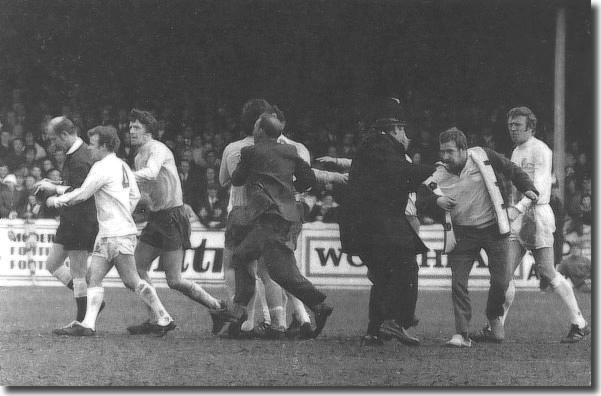 Rob
Bagchi and Paul Rogerson in The Unforgiven: 'Barry Davies is not a man
to condone violence. But on 17 April 1971 the normally polished Match
of the Day commentator came dangerously close.
Rob
Bagchi and Paul Rogerson in The Unforgiven: 'Barry Davies is not a man
to condone violence. But on 17 April 1971 the normally polished Match
of the Day commentator came dangerously close.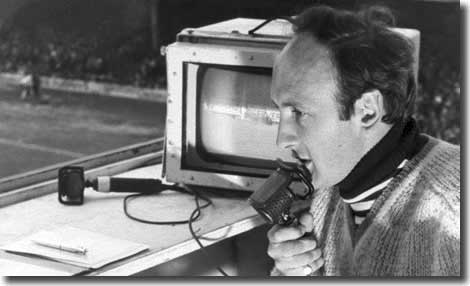 the wrath of the powers that be when they threw their shirts to
the ground and stormed off the Wembley pitch in the ill
tempered Charity Shield clash in 1974.
the wrath of the powers that be when they threw their shirts to
the ground and stormed off the Wembley pitch in the ill
tempered Charity Shield clash in 1974.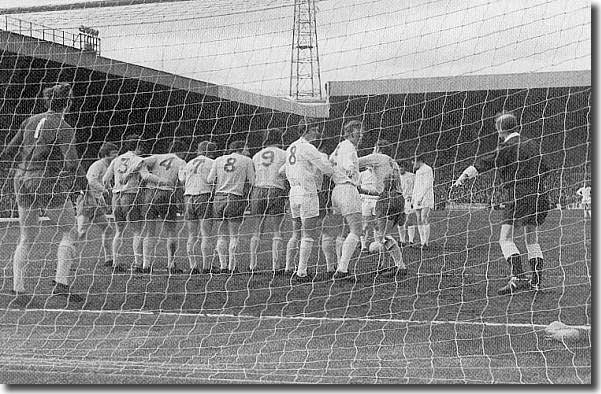 Cumbes
in the air. The keeper fumbled his catch, but the waiting Bates
could only put his follow up attempt feebly wide of the target.
Cumbes
in the air. The keeper fumbled his catch, but the waiting Bates
could only put his follow up attempt feebly wide of the target.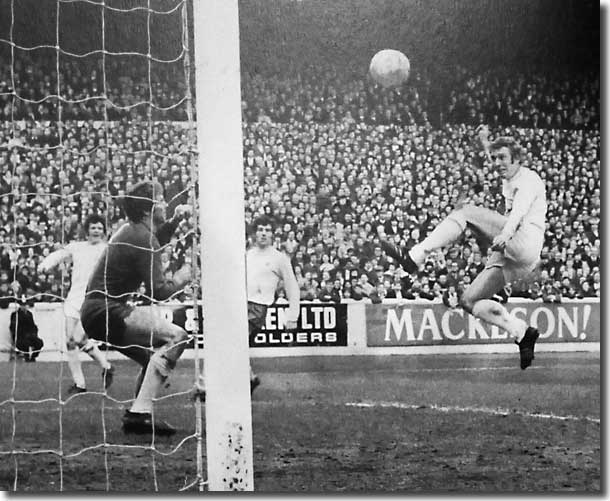 Albion man saw his first shot blocked
by Sprake's feet and then he could only put his follow up into
Sprake's hands on the six yard line. If the striker had kept his
head he would surely have taken the second opportunity, but it
came to his weaker left foot and he rushed his effort.
Albion man saw his first shot blocked
by Sprake's feet and then he could only put his follow up into
Sprake's hands on the six yard line. If the striker had kept his
head he would surely have taken the second opportunity, but it
came to his weaker left foot and he rushed his effort.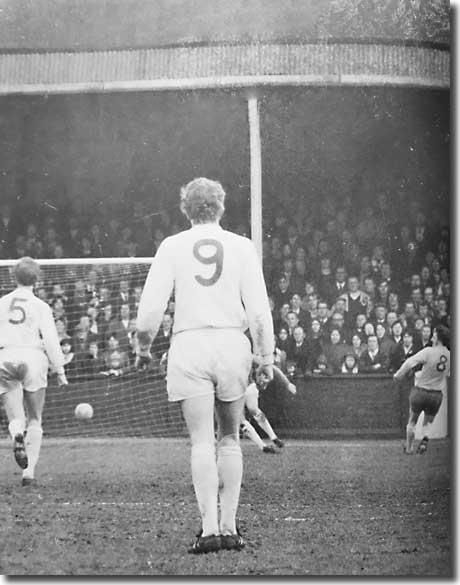 none of it.
none of it.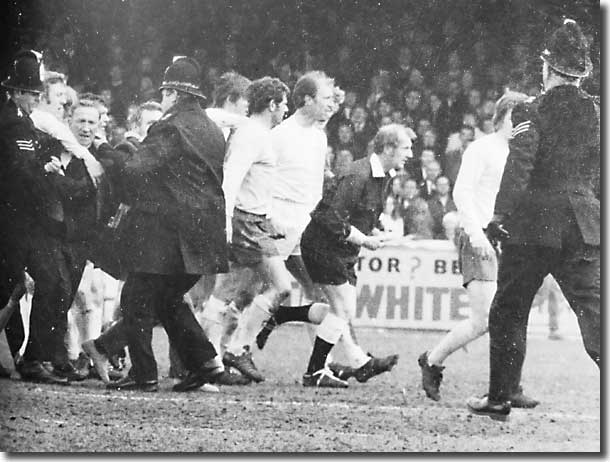 pass.
pass.
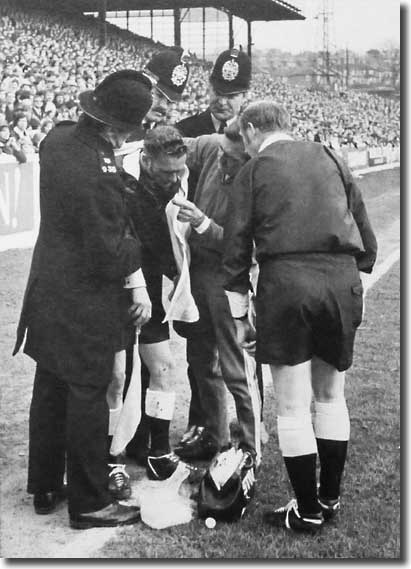 by Spurs, Liverpool and West Bromwich.
by Spurs, Liverpool and West Bromwich.